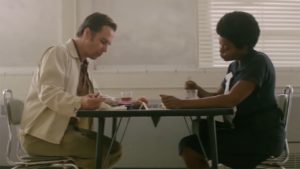We know going in to THE BEST OF ENEMIES that there will be soul-searching and redemption. The challenge for director Robin Bissell in adapting this true-life story from the book by Osha Gray Davidson was to frame doing the right thing in terms that truly demonstrate to the audience the temper of the times that made it all but unthinkable. In that, he has done an admirable job. In hiring Taraji P. Henson and Sam Rockwell to convey the highly-charged, deeply entrenched emotions at play, he has made two of the best decisions of his life.

Sam Rockwell, Taraji P. Henson
The time in 1971, in a New South that hasn’t quite left the old one behind in Durham, North Carolina. Integration has taken hold everywhere except the public school system. It’s a situation that will come to a head when the black elementary school catches fire, and the question arises of how the children who attended it will finish the year. When the NAACP petitions for complete school integration, the local politicians, unable to come up with a legal reason to turn it down, come up with a novel idea. They bring in Bill Riddick (Babou Ceesay) to hold a 10-day charrette, a sort of town meeting that brings opposing sides together in order to find common ground and consensus. The two most obvious leaders of those opposing sides are CP Ellis (Rockwell), the beloved Cyclops of the local KKK chapter, and Ann Atwater (Henson) the fierce, no-nonsense organizer who helms Breakthrough, a grassroots group that fights discrimination wherever it appears. And by fighting, I mean not just speaking truth to power, but yelling right in power’s white racist face until it pays attention.
There are certain tropes that a film like this must deploy. The initial scoffing by all parties involved. The tense first meeting that makes the entire enterprise seem hopeless. The gradual winning over of both parties, and, eventually, that glimpse of common ground. The trick is to make that necessary interesting. Editing that mirrors the emotions on screen helps but it’s Henson and Rockwell that give urgency and immediacy to the action, and that’s what makes it a pleasure to watch as well as a tutorial is the art of acting. Henson, prodigiously lumpy in shapeless clothing and eschewing makeup, doesn’t just walk, she is a projectile zeroing in on her target, with a face that is the essence of someone who is so fed-up with the status quo that you either help or get out of the way. There is a kinetic energy that rises from her even when she is not moving in waves of fury that could stop a rhino at twenty paces. Watching the ways she tears into a barbecue rib during her first meeting with Ellis is testament enough to her sheer power, and willingness to use it. Rockwell is the opposite, though his convictions are not less deeply rooted. But there is a twist. Ellis is never portrayed as a monster. Rather, he is a devoted father and husband who found a family-like place in the Klan, and beyond the racism, has taken the pride of community it represents, and its motto of not for oneself, but for others, to heart. By giving us that, it is not the question of when this metaphorical lead will be transmuted into something golden, but how Rockwell will show it happening. For Henson, it’s getting to the vulnerability from which such anger springs. It’s a less showy part, but Henson makes it equally vivid.
The rest is just so much window-dressing over the 10 days that follow, as each of these character must come to terms with the humanity that they find in the another, and, as a result, the flaws that they come to find in themselves. Bissell’s choices in showing the very real, physical dangers of bucking the system are handled with a restraint that makes the exposition all the more chilling as threats are barely veiled as social calls and legal protocols, leaving those that have been threatened helpless and shaken as only one can be when one’s sense of security is snatched away with a smile. The single best example is when Ellis walks into a Klan meeting, and the camera watches from his point of view as all eyes turn to him, and people speak quietly to one another on the stage. From what has gone before, it is impossible not be fearful about what will happen next. In a time and place where our introduction to Ellis is when he and his good ol’ boys are shooting up a white woman’s house because she’s dating a black man, this is a reality where no one is truly safe. Circumstances that make Atwater’s penchant for speaking up, forcefully and at length, all the more remarkable.
THE BEST OF ENEMIES recreates the slurs, epithets, and racism in ways designed to make us uncomfortable with the history of our country that happened within living memory. Yet it builds on that to give us a story that celebrates the courage it takes to compromise. By acutely observing the process, by letting each compromise sink in for the character, and for us, it becomes a kind of catharsis for the characters as they find their way, and for us to hope for the better angels of everyone’s nature.
Your Thoughts?